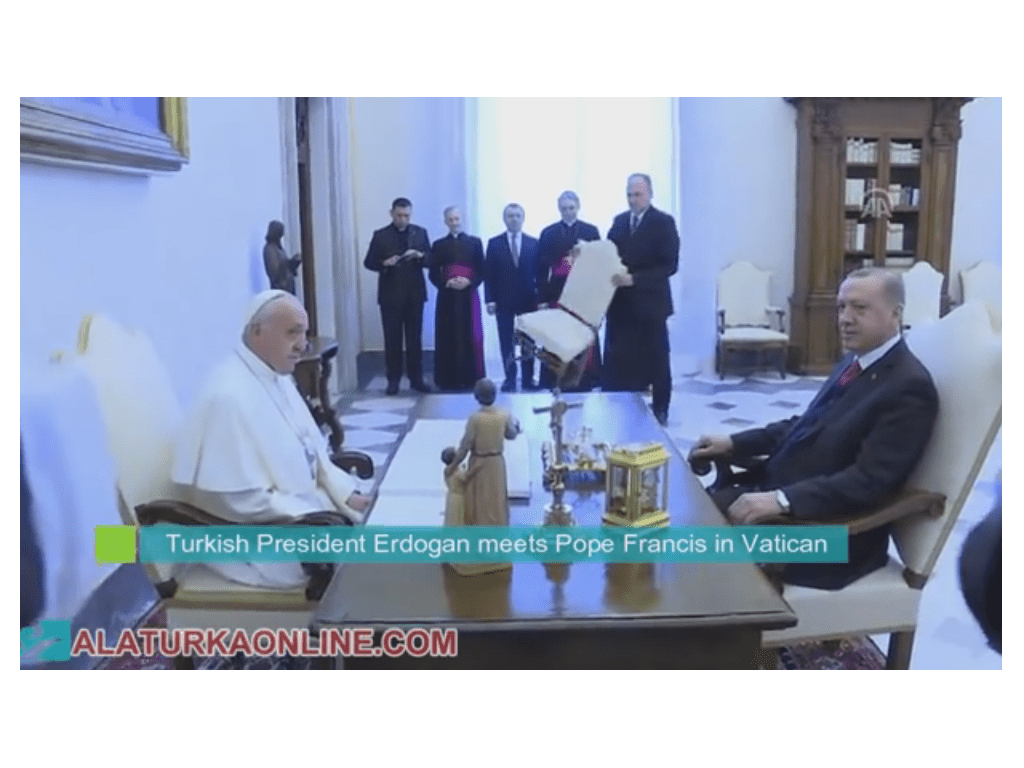The meeting held in the Vatican on 5 February between Turkish president Recep Tayyip Erdoğan and Pope Francis represented a propaganda event useful to improve the heavily deteriorated international image of the Turkish head of state.
Erdoğan seized the common view with the Vatican on the very sensitive issue of the status of Jerusalem in order to cast his positive image on the international scenario and to assert his authority, his prestige and his power domestically. His popularity had deteriorated at the international level since the creackdown carried out under his authority after the failed coup of 15 July 2016.
Turkey’s “Olive Branch” military operation in Afrin, in north-west Syria, against the Kurdish militias of the People’s Protection Units (Yekîneyên Parastina Gel, YPG), foster a negative perception in the Western sphere towards Turkey.
The meeting in Rome, also with Italian institutions, was instead an informal meeting, not a full-fledged bilateral meeting as described by various media. It served well Erdoğan’s objective to make business with the Italian industry elite.
The meeting with Pope was very evocative, in that it pulled sensitive strings in the Islamic world: Erdoğan was presented by pro-government Turkish media as a Muslim president talking about Jerusalem in the Vatican and championing the Palestinian cause. In other words, representing Islam before the highest representative of Christianity.
Furthermore, the absolute leader of Turkey met the Pope in order to be crowned. “Historical Mission”, was the headline of conservative daily Haber Türk. Erdoğan also turned to Italy to ask the EU not to block the accession negotiations. ”Europe should let us in”, he said.
Yet Brussels turned a blind eye even to the appeals coming from the Turkish opposition, whose main leader, Kemal Kılıçdaroğlu, has been repeatedly asking that chapters 23 and 24 on justice and freedom be opened so as to engage with Ankara in a closer and honest dialogue on human rights, the rule of law and democracy.
The goal of joining the European Union in the early 2000s was one of the few moments where a reasonably broad consensus emerged in the Turkey and it played an extraordinary role in the democratization process.
The responsibility for the current deteriorated relationship between Turkey and the EU does not lie in one of the sides alone nor in the authoritarian drift reflected in the policy of the Turkish government since 2013. The European Union failed its first reliability test on Turkey’s accession negotiations in 2004, when it open the door to Cyprus, a country divided in two. EU officials overlooked the aspirations of the Turkish side and granted Greek Cypriots – who found themselves as the sole representatives of the whole island – the option to veto the accession chapters of Ankara.
This marked the beginning of Turkish resentment towards the European Union which Turkey felt betrayed from. Then, in 2007 and 2008, came the refusal of Gemany’s Merkel and that of France’s Sarkozy. A slap in the face of Ankara which contributed greatly to end Turkey’s adjustment to the EU legal system which, until then, was proving a force of attraction enabling reforms at an unprecedented speed. The process halted and Erdoğan’s AKP government chose a different path.
Today privileged partnership, so far ostracized by Ankara, is seen by many Turkish decision-makers as the most convenient way to remain anchored to a fundamental strategic partern which involves a 45% trade exchange.
“Turkey’s accession to the EU can not wait ten more years”, said the leader of the Nonviolent Radical Party Marco Pannella in 2004. “Having Ankara among the capitals of the European Union is a structural and historical fact and we believe it is a matter of urgency because we do not know what Turkey will become otherwise, we do not know what Europe and the Mediterranean will be like tomorrow. Conceiving a new possible against a much likely hopeless present is urgent, if we want the European Union, the Mediterranean, Italy and Turkey to evolve”, Mr. Pannella said in July 2014 on the occasion of the foundation of the transnational organization “Turkey in Europe”.
Mariano Giustino

